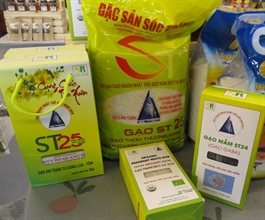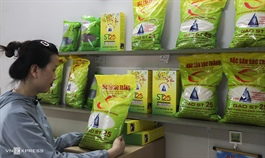Vietnamese enterprises scramble to procure chips amid global chip crisis
Vietnamese enterprises scramble to procure chips amid global chip crisis

In a recent post on his personal Facebook page, Nguyen Tu Quang, CEO of Bkav Company, said that makers of electronic products are “trying hard to find chips around the world.”
They are even scrambling to procure as many chips as possible to ensure their supply of semiconductors that function as the 'brain' of modern electronics, Quang added.
Up to 99 percent of businesses affected
Starting in mid-2020, Bkav Electronics began to see signs of scarcity of LCD screen components while costs continuously increased.
“In September 2020, many chip suppliers sent reports to us on increasing the standard lead time (SLT) for processor chips, memory chips, and power management chips,” said Tran Viet Hai, general director of Bkav Electronics, told Tuoi Tre (Youth) newspaper.
The cause of the prolonged lead time is reported to be due to the overload of purchase orders for chips at factories.
It is almost impossible to find supplies for processor chips of 45nm or more while their prices have increased five to seven times.
The chip molding factories maximize their profit by focusing on manufacturing processor chips of less than 10nm with high value added.
"By the end of 2020, manufacturers of chips and accessories had reported such scarcity and warned that the SLT might be prolonged to 10 months,” Hai said.
“Not only has the SLT become longer, but manufacturers have also increased their material stockpiles," said Le Quoc Chinh, production and technology director at state-run mobile network operator VNPT.
"Such a situation made chips and electronic accessories more and more scarce."
Chinh added that VNPT is producing a number of terminal receiver-transmitters, television service equipment, and camera surveillance devices.
With an output of about three million products per year, VNPT’s demand for chips will rise sharply.
However, the SLT has tended to be lengthened while the chip supply has been shrinking and the price has been soaring.
During the transition period between the 4G and 5G technologies, the Fourth Industrial Revolution and the demand for digital transformation are growing dramatically.
Therefore, the demand for industrial production as well as for chips will climb along with the speed of technological development on the market.
In addition to chips, the need for other accessories for electronic equipment will be growing compared to that in previous years.
Many manufacturers of electronic equipment and technological products in Vietnam admitted that they have been suffering the impacts of the global chip crisis at various levels.
That is because chips appear in most electronic appliances, from the simplest form of a citizen identification card to complicated forms of popular household appliances such as televisions, refrigerators, electromagnetic ovens, and electric cookers, to name a few.
Meanwhile, Vietnam has almost no enterprises that can make a complete chip through a process from research to design and production, so they all have to depend on chip suppliers from abroad, mainly China.
“Therefore, it can be said that more than 90 percent, even 99 percent, of Vietnamese manufacturers of electronic technological products have been affected by the global chip crisis,” said an expert in the field of microchips in Vietnam.
Race to buy chips
Facing a shortage of chips, many domestic manufacturers have to try to search and buy them from their partners that can provide the devices made redundant as a result of changes to their production plans.
“Such sales of chips have been taking place and a fight for chips has already begun,” the director of a company said, disclosing that his firm’s international procurement team has successfully procured 8,000 sets of accessories for AI View cameras.
As commented by many enterprises, such competition takes place every day and will continue in the coming time for all producers of technological products all over the world.
Hai said that Bkav often stocks a reserve of spare parts for use for 20 to 28 weeks, so it has yet to be affected much in the short term.
“For the long run, we have prepared plans to cope with the chip shortage, such as diversifying accessory supply sources, changing designs using parts with safe supply, and conducting strategic negotiations with other manufacturers to seek solutions,” said Hai.
Similarly, Chinh also said his enterprise is taking many measures to ensure enough raw materials for production, such as updating market information and forecasts, expanding the supplier network, looking for alternative materials, using common accessories, and limiting the use of exclusive ones.
Particularly, some businesses with abundant resources have proceeded with plans to relieve their dependence on foreign suppliers, anticipating that the chip crisis may extend further.
As a case in point, VNPT has actively used replacement accessories for their products while ensuring their quality.
Meanwhile, Dien Quang Lamp Joint Stock Company, a provider of lighting products, solutions and services, along with electric appliances and intelligent control equipment, has invested in synchronous production lines of international standards, including an automatic chip production line for LED lights with a capacity of 150 million chips per year.
“Dien Quang is the first manufacturer in Vietnam to make LED SMD chips with capacities of 0.2w, 0.5w and 1w, enough to meet the production of LED lights for domestic consumption and export,” a representative of this company said.
Causes of global shortage
The chip shortage has come amid rising demand for consumer electronics during the COVID-19 pandemic, which started early last year, the Guardian reported in a quote from Samsung, the world’s largest manufacturer of computer chips in the world, as well as one of the biggest consumers.
A serious imbalance in supply and demand of chips in the information technology sector has taken place globally, said Koh Dong-jin, the company’s co-chief executive.
Samsung has said it could delay the release of the next Galaxy Note smartphone until 2022 because of the shortage, while Apple, the world’s biggest buyer of chips, was one of the worst affected companies, delaying the launch of the iPhone 12 last year, the Guardian reported.
Consumers are facing price hikes and shortages of products from TVs and mobile phones to cars and game consoles as a global dearth in semiconductors grows, said the newspaper.
The chip shortage has come from a combination of factors, as carmakers, which closed their plants during the COVID-19 pandemic in 2020, compete against the sprawling consumer electronics industry for chip supplies, Reuters explained.
Consumers have spent more on laptops, gaming consoles and other electronic products during the pandemic, causing tighter chip inventory.
They also bought more cars than expected by industry officials last spring, further straining supplies of the semiconductor, the British news agency said.
The recent sanctions by the U.S. against Chinese technological giants have been blamed for worsening the chip crisis, with the shortage spreading from the automobile industry to a series of consumer electronic sectors, including smartphones, refrigerators, and microwave ovens.
“Clearly the unwarranted U.S. sanctions against Huawei and other [Chinese] companies are creating an industry-wide supply shortage, and this could even trigger a new global economic crisis,” Nikkei Asia quoted Eric Xu, Huawei’s rotating chairman, as saying.






















